#diplomatic history
Text

"A work of outstanding quality, Tony McCulloch’s book is based on painstaking original research. It successfully engages with, and modifies, many conventional understandings of US-UK relations in the 1930s. McCulloch is a world-class expert on this subject and this will become a classic text."
8 notes
·
View notes
Text
“The coalition that fought and finally defeated Napoleon's France was held together by two forces, distinct aspects of the same danger in its eyes: the threat to the actual possessions of the rulers, and that to the old order of society. The length and magnitude of the effort which it had been necessary to exert in order to defeat Napoleon served to emphasize, in the eyes of the victors, the need of complete obliteration of what he had stood for. It was only fitting therefore that Metternich should preside at the Congress of Vienna and remain the guiding hand of the continent in the years that were to follow. We can see that the attempt was doomed, but it took a third of a century before he himself had to relinquish office.”
— René Albrecht-Carrié (source)
(bold lettering by me)
#René Albrecht-Carrié#diplomat#diplomatic history#history#quote#Napoleon#napoleon bonaparte#Metternich#klemens von metternich#napoleonic#napoleonic era#first french empire#french empire#1800s#french revolution#france#Italy#diplomacy#frev#IR#international relations#ref#reference#quotes#book#napoleonic wars#Congress of Vienna
17 notes
·
View notes
Photo
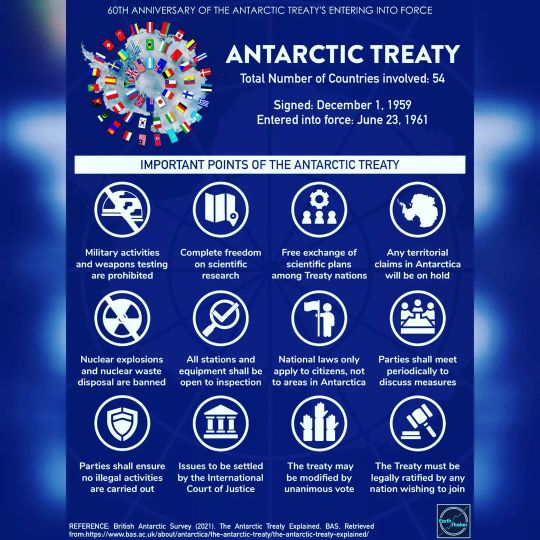
On This Day in History June 23, 1961: The Antarctic Treaty (which was signed on December 1, 1959) went into effect. According to the Secretariat of the Antarctic Treaty website:
"The original Signatories to the Treaty are the twelve countries that were active in Antarctica during the International Geophysical Year of 1957-58 and then accepted the invitation of the Government of the United States of America to participate in the diplomatic conference at which the Treaty was negotiated in Washington in 1959. These Parties have the right to participate in the meetings provided for in Article IX of the Treaty (Antarctic Treaty Consultative Meetings, ATCM).
Since 1959, 42 other countries have acceded to the Treaty. According to Art. IX.2, they are entitled to participate in the Consultative Meetings during such times as they demonstrate their interest in Antarctica by “conducting substantial research activity there” . Seventeen of the acceding countries have had their activities in Antarctica recognized according to this provision, and consequently there are now twenty-nine Consultative Parties in all. The other 25 Non-Consultative Parties are invited to attend the Consultative Meetings but do not participate in the decision-making."
To this day, Antarctica remains a haven for peaceful research.
#AntarcitcaTreaty #Antarctica #DiplomaticHistory #20thCenturyHistory #WorldHistory #History #Historia #Histoire #Geschichte #HistorySisco
https://www.instagram.com/p/CfJpbKxO5Nv/?igshid=NGJjMDIxMWI=
#Antarctica Treaty#Antarctica#Diplomatic History#Scientific History#20th Century History#World History#History#Historia#Histoire#Geschichte#HistorySisco
2 notes
·
View notes
Text
In February 1959, the threat of inclement weather during the winter months, defined as October through April, led the United States to change the protocol surrounding the arrival of foreign leaders visiting Washington, DC. The Department of State announced that during those months the President would not meet foreign leaders at the airport. During the rest of the year, however, he would.
1 note
·
View note
Text
The Pacific War and Japan’s diplomacy in Asia
New item:
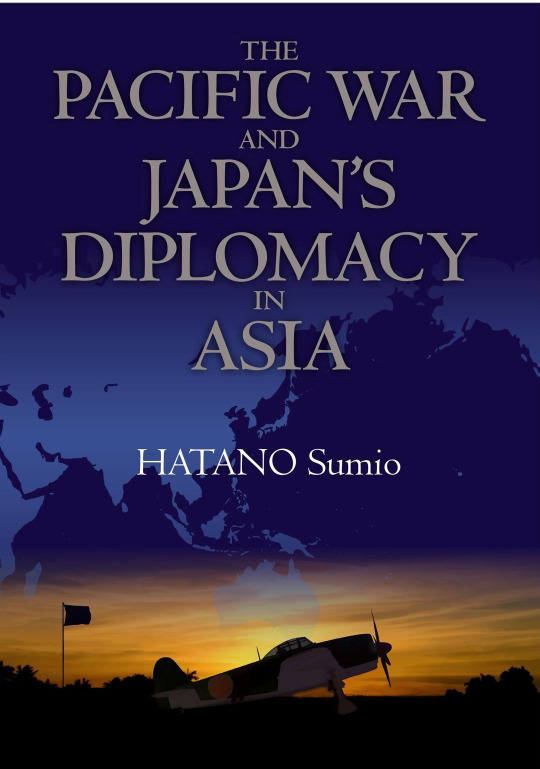
"Focusing on the significance of the Greater East Asia policies promoted by Prime Minister Shigemitsu Mamoru during World War II - including the issues of approving independence for Burma and the Philippines as well as the liberation of French Indochina - Prof. Hatano Sumio sheds light on the formation and evolution of Japan's diplomacy in Asia. He then goes on to verify the meaning of what was held to be Japan's war aim - liberation of the people of Asia - and its impact on policies"--Publisher’s description.
Shelf: 319.1 HAT ENG
[Taiheiyō sensō to ajia gaikō. English].
The Pacific War and Japan's diplomacy in Asia.
by Hatano Sumio ; translated by the Japanese Institute of International Affairs (JIIA).
1st English edition.
Tokyo : Japan Publishing Industry Foundation for Culture, 2021.
ISBN: 9784866581286
431 pages ; 22 cm.
Originally published in the Japanese language under the title Taiheiyō sensō to ajia gaikō by University of Tokyo Press in 1996.""--Title page verso.
Includes bibliographical references and index.
Translated into English from the Japanese.
Table of contents:
Opening of war against the United States, Britain, and the Netherlands and a plan to end the war.
Political battle over advance into West Asia.
Construction of the Greater East Asia and the ministry of Greater East Asia.
Evolution of the new China policy.
"Independence" of Burma and the Philippines.
Outlines for the political guidance of Greater East Asia and the Japan-China Alliance Treaty.
Greater East Asia Conference and joint declaration.
Repercussions of the Greater East Asia declaration.
Foreign Minister Shigemitsu and Greater East Asia diplomacy : Indonesia and French Indochina.
Shigemitsu Mamoru and wartime Diplomacy.
#mamoru shigemitsu#diplomatic history#ww2#politics and government#foreign relations#asia#new 2022 10#jstudies
0 notes
Text
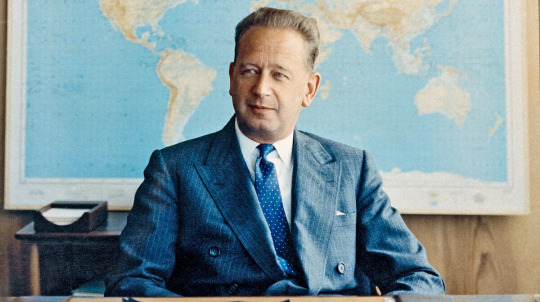
Dag Hammarskjöld (deceased)
Gender: Male
Sexuality: Gay / Asexual
DOB: 29 July 1905
RIP: 18 September 1961
Ethnicity: White - Swedish
Occupation: Economist, diplomat, Secretary General of the United Nations
Note: The first and only posthumous recipient of the Nobel Peace Prize
#Dag Hammarskjöld#Dag Hammarskjold#lgbt history#asexuality#lgbt#male#gay#asexual#1905#rip#historical#white#swedish#politician#entrepreneur#economist#diplomat#first#popular#popular post
131 notes
·
View notes
Text
Can you imagine if Celestia decides to mind control the archons, realizing that a revolution is probably coming?
The main goal is to sow chaos and distrust in Teyvat, stopping the Tsaritsa's plans while showing Celestia's might.
What they didn't expect was for said archons to fight back, most with contingencies made centuries ago.
Venti isolated himself in a wind barrier, making sure nobody could enter, and that his powers couldn't break out. He is NOT having panic attacks due to claustrophobia and memories of Decarabian's rule, thank you very much.
Zhongli sealed himself deep undergound, in a similar fashion to Azdaha, he brought plenty of books to pass the time, though he is mostly suffering from a migraine due to fighting off Celestia.
Ei is literally just chilling in the Plane of Euthymia while the Shogun runs Inazuma. Makoto's subconsiousness is fistfighting Celestia's influence.
To make sure nobody could use her control over Irminsul and the people's dreams and minds, Nahida locked herself up in the Sanctuary of Surasthana again, sealing her conciousness. It worked, but she's afraid and alone and crying while reliving her worst nightmare. Scaramouche and Cyno are trying to break the barrier in frantic desperation.
We don't know much about Murata, but she's probably just chilling in a volcano. Meanwhile the Tsaritsa froze herself, letting Pierro run the country and the Fatui in her stead.
Meanwhile Furina is hiding in the dephts of Fontaine's sea, sealing herself in a cave with the use of Pneuma and Ousia energies (if she tries to break the barrier, or attempts to control Fontaine's waters, the barrier strikes, she went a bit overboard because tsunamis are no joke).
So yeah, the plan didn't go as expected, and Celestia also didn't account for the Traveler... or the dragons...
The Traveler is basically going around saving everyone, using his connection to the elements to break barriers and fight off Celestia's influence. We start with Sumeru, mostly because Scara all but drags us to save Nahida.
As for the Sovereings...
Dvalin is guarding Venti's temporary "prison", trying to sing as many ballads as he can remember in hopes to calm him down. He sometimes sings the notes wrong because it always made Venti laugh.
Azdaha's conciousness found Zhongli's seal. He connected both of the places so that they can keep each other company. They're alternating between chess matches with soothing tea and Oshmantus wine to friendly spars that shake Liyue (Zhongli is still a feral war god that likes to fight).
Ei is having a great time in the Plane of Euthymia, especially now that Kokomi came along. They're chatting about light novels.
Apep managed to connect to Nahida's conciousness and is currently strangling the Celestial influence. She claims it's just her way of settling the score after we helped her in 3.6, as well as a good excuse to fight Celestia. The fact that she is telling stories of the old days of Teyvat to calm Nahida down is just a mere coincidence. (The maternal instincts kicked in)
Neuvillette broke though the Pneuma Ousia barrier with a small army of Melusines. He is currently guarding the archon in his dragon form while the Melusines perform plays to distract her (they want to start a troupe, so these are all original scripts, they were all approved).
We don't know much about the other two dragons, so let's just say they're guarding the borders of Natlan and Snezhnaya.
CONGRATULATIONS CELESTIA! Not only did your plan fail, but now all of Teyvat is mad at you!! Even the Sovereigns (that are supposed to resent the archons, mind you) are angry on their behalf!!!!🥳🥳🥳
Bonus: Neuvillette watching the show of the melusines while Furina sleeps next to his paws:

#genshin impact#venti#zhongli#ei#nahida#furina#murata#tsaritsa#dvalin#azhdaha#apep#sangonomiya kokomi#neuvillette#the sanctuary of surasthana is filled with plushies and sweets for when nahida is freed#neuvillette is so mad that Fontaine is almost drowning#the melusines are great artists#apep: all children should know about the history of the world they live in. especially the manifestation of irminsul! Now stop crying!!#scaramouche is almost recreating his shouki no kami form#at least watatsumi and narukami's diplomatic relationships improved
213 notes
·
View notes
Text
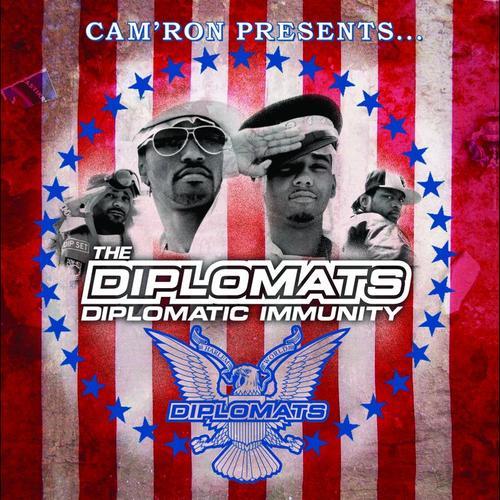
Today in Hip Hop History:
The Diplomats released their debut album Diplomatic Immunity March 25, 2003
#today in hip hop history#todayinhiphophistory#hiphop#hip-hop#hip hop#music#history#hip hop music#hip hop history#hip hop culture#music history#the diplomats#diplomats#diplomatic immunity#album#cam'ron#camron#jim jones#juelz santana#harlem#harlem world#dipset#2003
39 notes
·
View notes
Note
Just going off the vibes I get alone I think tau should basically be portrayed as the British empire
While I get the gist of your notion what with the annexing and assimilating... no, I don't agree.
The signature thing the T'au do is put up a front of diplomatic inroads, usually trade or medical relief or general assistance and political interaction, and then use that as an avenue to introduce more and more of their forces and culture and ideals to a non-integrated populace/world whilst passively using all their ships and suits as a show of force. Even if that populace/world is difficult, provided that violence is kept to like... a controllable level, the T'au aren't inclined to explode into warfare.
Now, obviously, by today's standards, this is still very bad. We understand what they're doing is colonisation, but the key difference between the T'au and the British Empire is that T'au colonisation aims to be as bloodless as possible, and takes a vested interest in communicating with and learning about the people they're trying to assimilate, so as to show the doctrines of the Greater Good to them in a way that resonates more effectively.
The British Empire didn't give a single fuck about the ins and outs of cultural integration. The British Empire didn't invade new places with the intent to be as tactful as possible, or to induce amalgamation through politicking and implicit threat. The British Empire wanted to go to other places, take possession of all their shit, kill/torture anyone who disagreed, and then fill all the gaps created by these murders with upstanding white British people.
You know the bits of the Horus Heresy early on where the Imperium is "bringing order" to "savage"/"degenerate"/"heathen" worlds by giving them one opportunity to accept being part of the war machine, then siccing thousands of bloodthirsty soldiers on them if they refused, and then graciously accepting them into the Emperor's fold? That's the British Empire.
#I need you to understand how utterly fucking murderous and hateful the British Empire was#And how gleefully unsubtle it was about it.#I encourage you to read some history books and accounts. It is seven kinds of fucked and has done lasting damage to many nations#The T'au Empire are not even slightly a force for good by modern standards#But they try very hard to be as subtle and “diplomatic” as possible
135 notes
·
View notes
Text
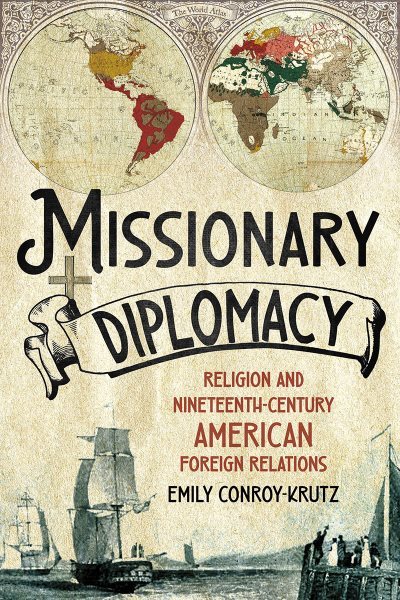
"Impressive. With stories and anecdotes of missionaries from all around the world, Missionary Diplomacy convincingly demonstrates the inextricable connection of Protestant Christian missionaries and American foreign policy in the nineteenth century. This is essential reading on the history of United States foreign relations."
5 notes
·
View notes
Text
"One time Elvis got complaints from the neighbors about noisy fans at the gates of his Bell Air home, he jumps in his Mercedes Limo saying to the fans; "Follow Me"! He drives down to Sunset Boulevard, pulls to the side and starts to sign autographs through the sunroof of the car!"
via Nancy Z. on pintrest



Elvis signing autographs from his Mercedes Benz 600 limo sunroof. Sunset Boulevard, Nov. 12, 1970
#was doing some research for my friend on the 600 series. he loves mercedes so when he found out my special intrest overlapped w his we did#some digging. turns out not only is the 600 one of the most iconic limos made with diplomats and celebrities in mind. most often they#were custom ordered and built with specific details made for each owner. elvis owned two#the one shown here is the first a 1969 model bought in 1970 and thr 2nd was a powder blue 1970 model that he later gifted to a friend#elvis#elvis presley#elvis car#mercedes 600 series#elvis history
240 notes
·
View notes
Text
#Dipset Anthem#The Diplomats (2003)#Dipset#Hip hop#underground hip hop#new music#rap music#rap#rapper#hip hop history#hip hop 50
11 notes
·
View notes
Text

Mike Luckovich ::
* * * *
LETTERS FROM AN AMERICAN
February 10, 2024
HEATHER COX RICHARDSON
FEB 11, 2024
A key story that got missed yesterday was that the Senate voted 64–19 to allow a bill that includes $95.34 billion in aid for Ukraine, Israel, and Taiwan to advance a step forward. In terms of domestic politics, this appears to be an attempt by those who controlled the Republican Party before Trump to push back against Trump and the MAGA Republicans.
MAGA lawmakers had demanded border security measures be added to a national security supplemental bill that provided this international aid, as well as humanitarian aid to Gaza, but to their apparent surprise, a bipartisan group of lawmakers actually hammered out that border piece. Trump immediately demanded an end to the bill and MAGA obliged on Wednesday, forcing the rest of the party to join them in killing the national security supplemental bill. House Republicans then promptly tried to pass a measure that provided funding for Israel alone.
At stake behind this fight is not only control of the Republican Party, but also the role of the U.S. in the world—and, for that matter, its standing. And much of that fight comes down to Ukraine’s attempt to resist Russia’s invasions of 2014 and 2022.
Russian president Vladimir Putin is intent on dismantling the rules-based international order of norms and values developed after World War II. Under this system, international organizations such as the United Nations provide places to resolve international disputes, prevent territorial wars, and end no-holds-barred slaughter through a series of agreements, including the United Nations Charter, the Universal Declaration of Human Rights, the U.N. Genocide Convention, and the Geneva Conventions on the laws of war.
Putin’s invasion of Ukraine, deliberate targeting of civilian populations, and war crimes are his way of thumbing his nose at the established order and demanding a different one, in which men like him dominate the globe.
Trump’s ties to Russia are deep and well documented, including by the Senate Intelligence Committee, which was dominated by Republicans when it concluded that Trump’s 2016 campaign team had worked with Russian operatives. In November 2022, in the New York Times Magazine, Jim Rutenberg pulled together testimony given both to Special Counsel Robert Mueller’s investigation and the Senate Intelligence Committee, transcripts from the impeachment hearings, and recent memoirs.
Rutenberg showed that in 2016, Russian operatives had presented to Trump advisor and later campaign manager Paul Manafort a plan “for the creation of an autonomous republic in Ukraine’s east, giving Putin effective control of the country’s industrial heartland, where Kremlin-armed, -funded, and -directed ‘separatists’ were waging a two-year-old shadow war that had left nearly 10,000 dead.”
But they were concerned that the North Atlantic Treaty Organization (NATO) might stand in their way. Formed in 1947 to stand against Soviet expansion and now standing against Russian aggression, NATO is a collective security alliance of 31 states that have agreed to consider an attack on any member to be an attack on all.
In exchange for weakening NATO, undermining the U.S. stance in favor of Ukraine in its attempt to throw off the Russians who had invaded in 2014, and removing U.S. sanctions from Russian entities, Russian operatives were willing to put their finger on the scales to help Trump win the White House.
When he was in office, Trump did, in fact, try to weaken NATO—as well as other international organizations like the World Health Organization—and promised he would pull the U.S. out of NATO in a second term, effectively killing it. Rutenberg noted that Russia’s February 2022 invasion of Ukraine looks a lot like an attempt to achieve the plan it suggested in 2016. But because there was a different president in the U.S., that invasion did not yield the results Putin expected.
President Joe Biden stepped into office more knowledgeable on foreign affairs than any president since Dwight Eisenhower, who took office in 1953. Biden recognized that democracy was on the ropes around the globe as authoritarian leaders set out to dismantle the rules-based international order. He also knew that the greatest strength of the U.S. is its alliances. In the months after he took office, Biden focused on shoring up NATO, with the result that when Russia invaded Ukraine again in February 2022, a NATO coalition held together to support Ukraine.
By 2024, far from falling apart, NATO was stronger than ever with the addition of Finland. Sweden, too, is expected to join shortly.
But far more than simply shore up the old system, the Biden administration has built on the stability of the rules-based order to make it more democratic, encouraging more peoples, nations, and groups to participate more fully in it. In September 2023, Secretary of State Antony Blinken explained to an audience at the Johns Hopkins School of Advanced International Studies that the end of the Cold War made people think that the world would inevitably become more peaceful and stable as countries cooperated and emphasized democracy and human rights.
But now, Blinken said, that era is over. After decades of relative stability, authoritarian powers have risen to challenge the rules-based international order, throwing away the ideas of national sovereignty and human rights. As wealth becomes more and more concentrated, people are losing faith in that international order as well as in democracy itself. In a world increasingly under pressure from authoritarians who are trying to enrich themselves and stay in power, he said, the administration is trying to defend fair competition, international law, and human rights.
Historically, though, the U.S. drive to spread democracy has often failed to rise above the old system of colonialism, with the U.S. and other western countries dictating to less prosperous countries. The administration has tried to avoid this trap by advancing a new form of international cooperation that creates partnerships and alignments of interested countries to solve discrete issues. These interest-based alignments, which administration officials refer to as “diplomatic variable geometry,” promise to preserve U.S. global influence and perhaps an international rules-based order but will also mean alliances with nations whose own interests align with those of the U.S. only on certain issues.
In the past three years, the U.S. has created a new security partnership with Australia and the United Kingdom, known as AUKUS, and held a historic, first-ever trilateral leaders’ summit at Camp David with Japan and the Republic of Korea. It has built new partnerships with nations in the Indo-Pacific region, as well as with Latin American and Caribbean countries, to address issues of immigration; two days ago the Trilateral Fentanyl Committee met for the fourth time in Mexico. This new system includes a wider range of voices at the table—backing the membership of the African Union in the Group of 20 (G20) economic forum, for example—advancing a form of cooperation in which every international problem is addressed by a group of partner nations that have a stake in the outcome.
At the same time, the U.S. recognizes that wealthier countries need to step up to help poorer countries develop their own economies rather than mine them for resources. Together with G7 partners, the U.S. has committed to deliver $600 billion in new investments to develop infrastructure across the globe—for example, creating a band of development across Africa.
Biden’s is a bold new approach to global affairs, based on national rights to self-determination and working finally to bring an end to colonialism.
The fight over U.S. aid to Ukraine, Israel, Taiwan, and the other countries with which we have made partnerships is not about saving money—most of the funds for Ukraine are actually spent in the U.S.—or about protecting the U.S. border, as MAGA Republicans demonstrated when they killed the border security bill. It is about whether the globe will move into the 21st century, with all its threats of climate change, disease, and migration, with ways for nations to cooperate, or whether we will be at the mercy of global authoritarians.
Trump’s 2024 campaign website calls for “fundamentally reevaluating NATO’s purpose and NATO’s mission,” and in a campaign speech in South Carolina today, he made it clear what that means. Trump has long misrepresented the financial obligations of NATO countries, and today he suggested that the U.S. would not protect other NATO countries that were “delinquent” if they were attacked by Russia. “In fact,” he said, “I would encourage [Russia] to do whatever the hell they want.”
—
LETTERS FROM AN AMERICAN
HEATHER COX RICHARDSON
#political cartoons#Mike Luckovich#Letters From an American#Heather Cox Richardson#history#NATO#alliances#foreign policy#AUKUS#security partnership#democracy#21st century#diplomatic variable geometry
11 notes
·
View notes
Text

I have a profound doubt as to whether the adventure is, after all, worth the candle. Not because of the danger - I don't mind that; but I am beginning to wonder what profit I shall get out of it all … There are two ways of profitable travel in Arabia. One is the Arabia Deserta way, to live with the people, and to live like them for months and years … It's clear I can't take that way; the fact of my being a woman bars me from it. And the other is to ride swiftly through the country with your compass in hand, for the map's sake and for nothing else, I might be able to do that over a limited space of time, but I am not sure. Anyway, it's not what I'm doing now … I almost wish that something would happen - something exciting, a raid, or a battle! Yet that's not my job either. What do ineffective archaeologists want with battles! They would only serve to pass the time, and leave as little profit as before … it's a bore being a woman when you're in Arabia.
Gertrude Bell, letter written in 1914, Letters of Gertrude Bell (1929)
Born 155 years ago today on 14 July 1868, Gertrude Bell defied societal norms and shattered barriers as an English writer, traveler, political officer, administrator, and archaeologist. She was also the greatest woman mountaineer of her age. She was also the first woman to earn first class honours in modern history at Oxford.
#bell#gertrude bell#quote#woman#femme#icon#british#archaeologist#diplomat#spy#explorer#travel#wanderlust#first world war#history
43 notes
·
View notes
Text
watching some lecture about the decline and fall of the roman empire (as in, the work of history by edward gibbon, not just the historical topic) and gibbon just got quoted as calling claudius "feeble". when it comes to the roman empire, my memory is a total sieve, and the only thing that I can ever remember is my middle-school happiness while reading i, claudius by robert graves so i have to be like wtf gibbon don't say that about my blorbo
#and then i read claudius the god in high school and didnt like it as much so maybe claudius isnt my blorbo after all#livia girlbossed too hard and tiberius was too pathetic and then too disgusting soon afterward...#theonly other roman emperor i can recall is antoninus pius for sending diplomats to china.#alternate history wherein imperial rome and imperial china were actively in contact ... imagine that slay ...
5 notes
·
View notes
Text
Napoleon’s instructions to Bourrienne:
“Do not wake me when you have good news to communicate. With such there is no hurry. But when you bring bad news, rouse me instantly, for then there is not a moment to lose.”
#quote#history#Napoleon#napoleon bonaparte#Bourrienne#Louis Antoine Fauvelet de Bourrienne#19th century#france#first french empire#french#napoleonic era#napoleonic#french empire#diplomat#1800s#napoleonic wars#text post#mine#French history#instructions#advice#sleep
27 notes
·
View notes